2018年中考英语复习七年级下册 Modules 5~8习题课件
文档属性
| 名称 | 2018年中考英语复习七年级下册 Modules 5~8习题课件 | 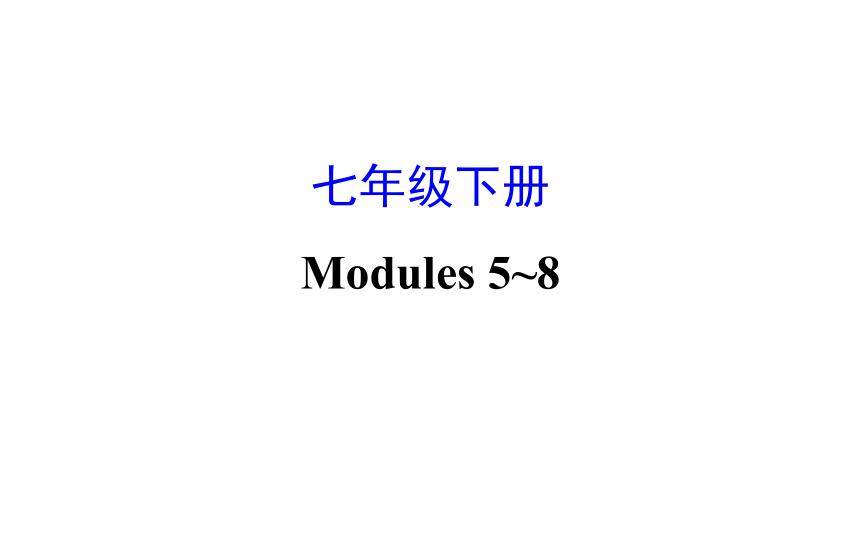 | |
| 格式 | zip | ||
| 文件大小 | 564.1KB | ||
| 资源类型 | 教案 | ||
| 版本资源 | 外研版 | ||
| 科目 | 英语 | ||
| 更新时间 | 2018-04-03 16:13:24 | ||
图片预览

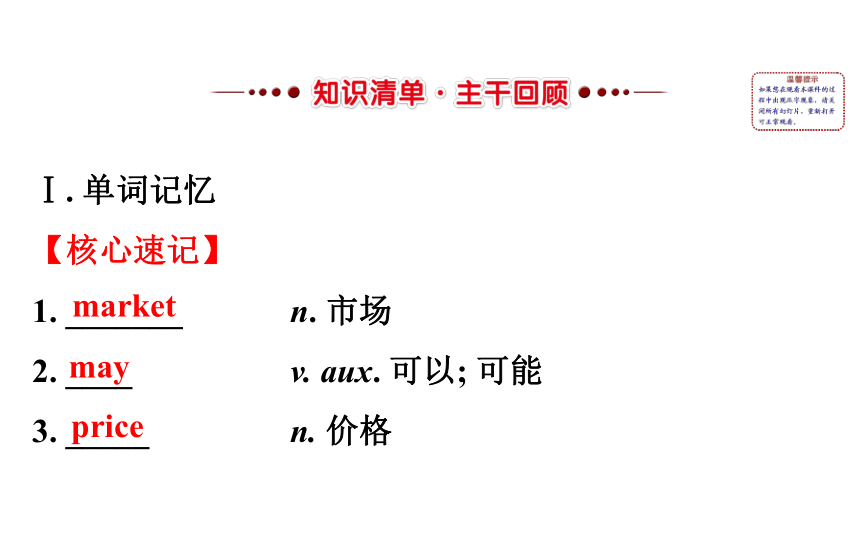
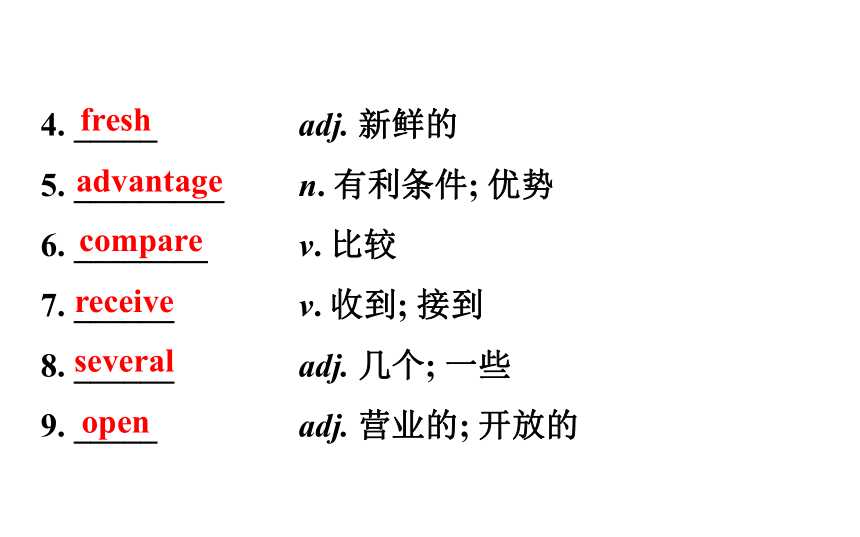
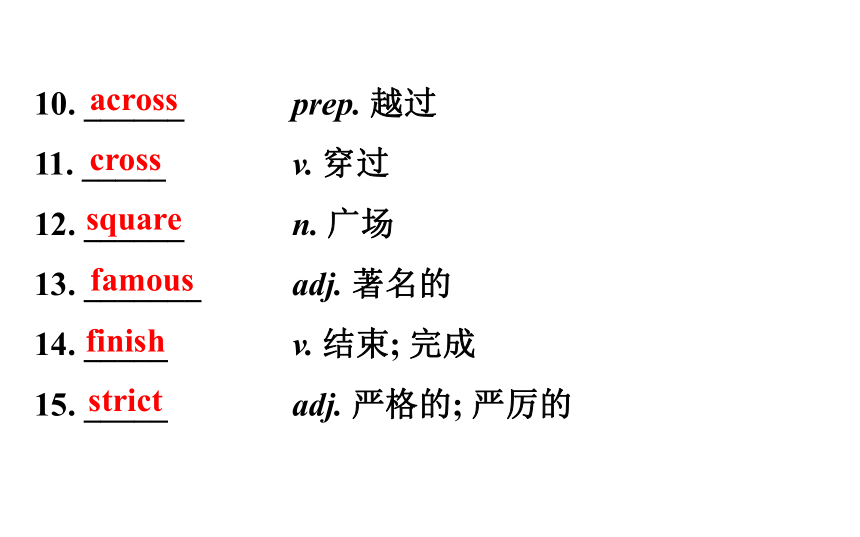
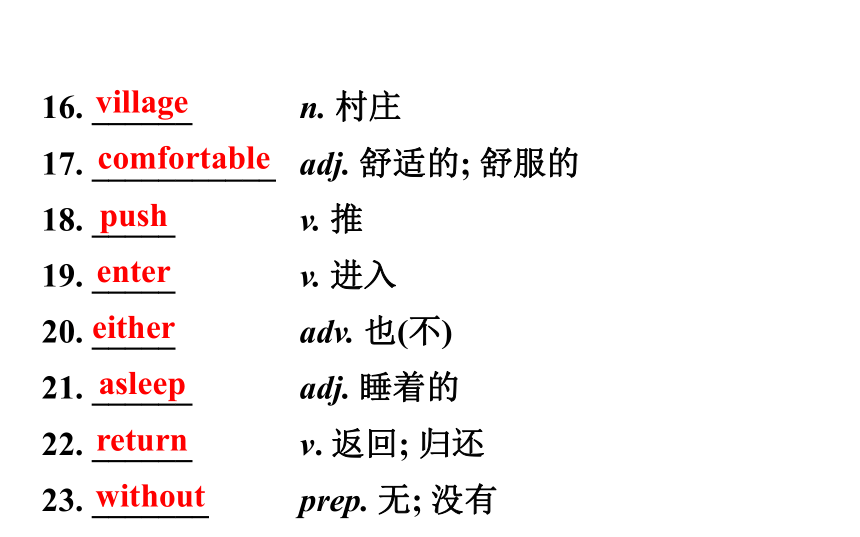
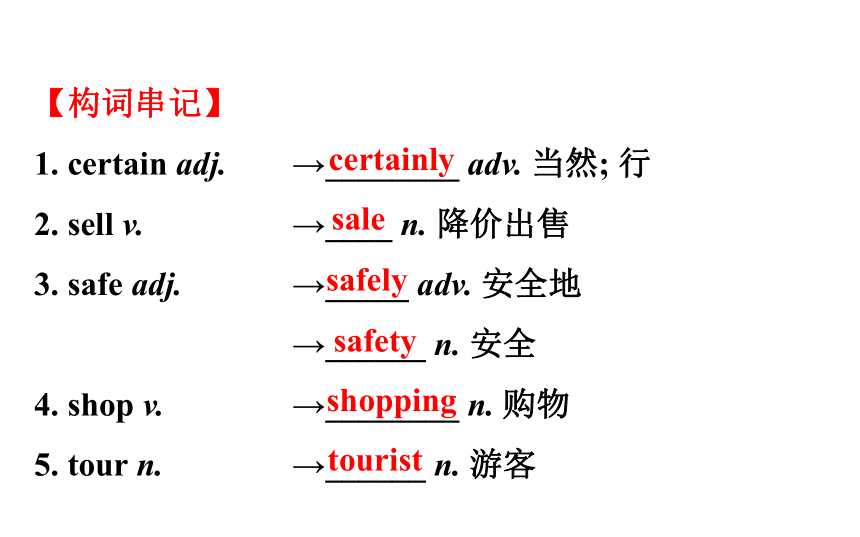
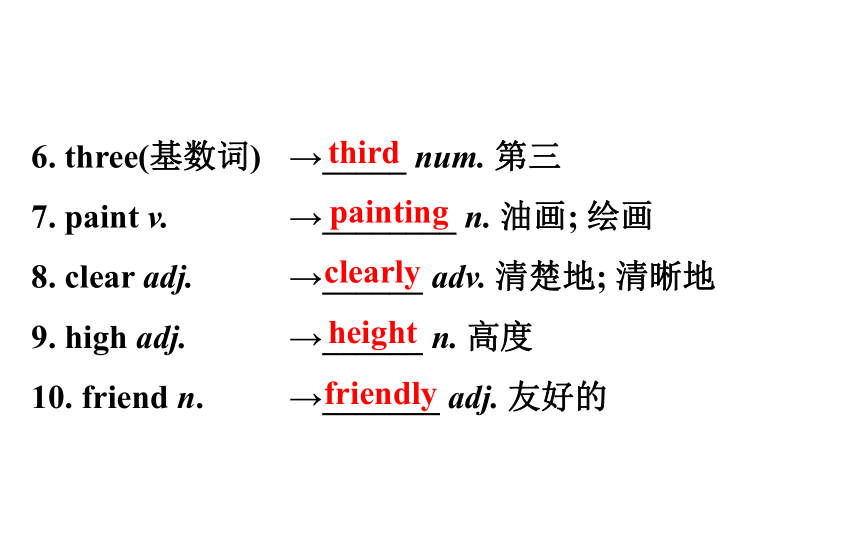
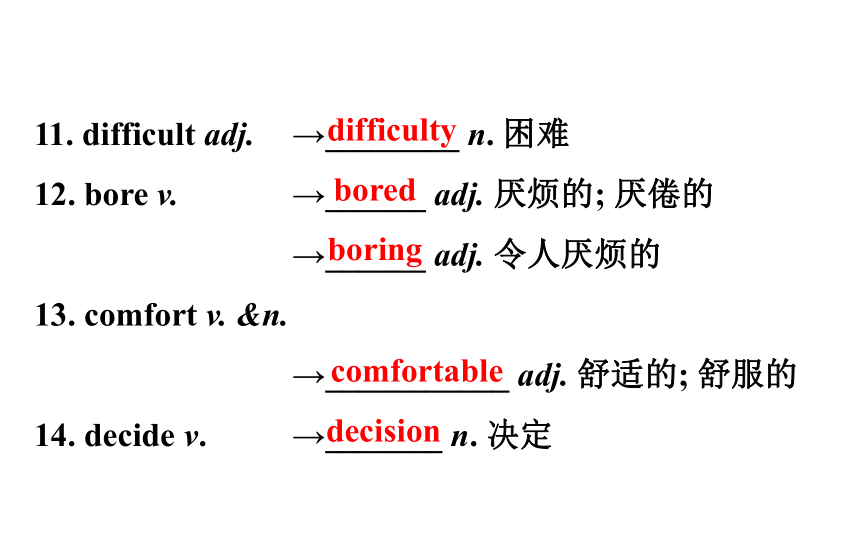
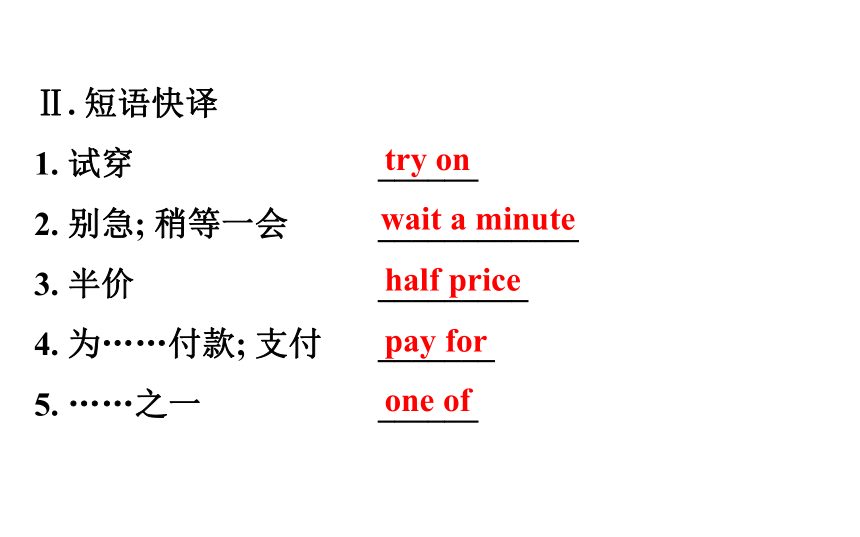
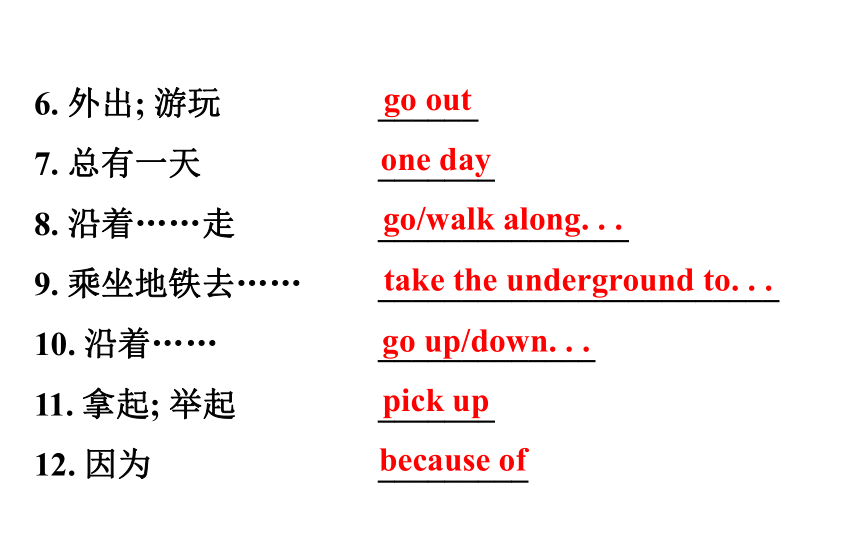
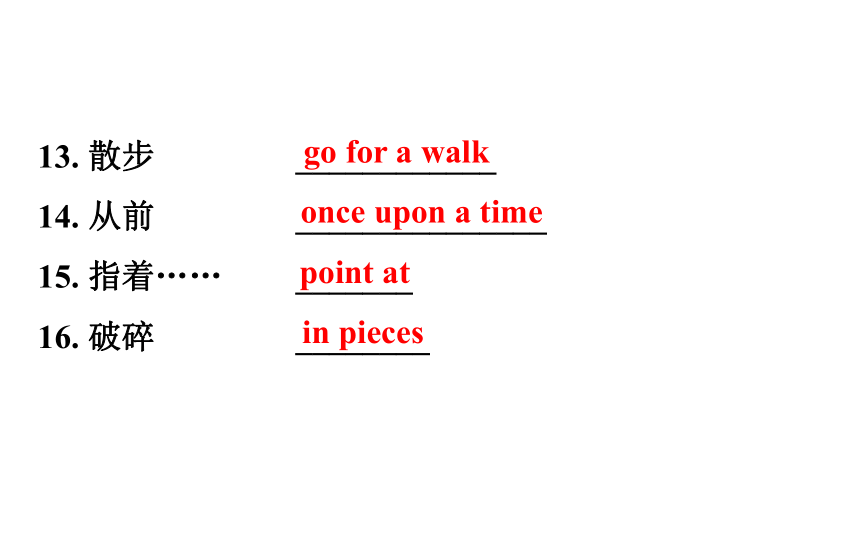
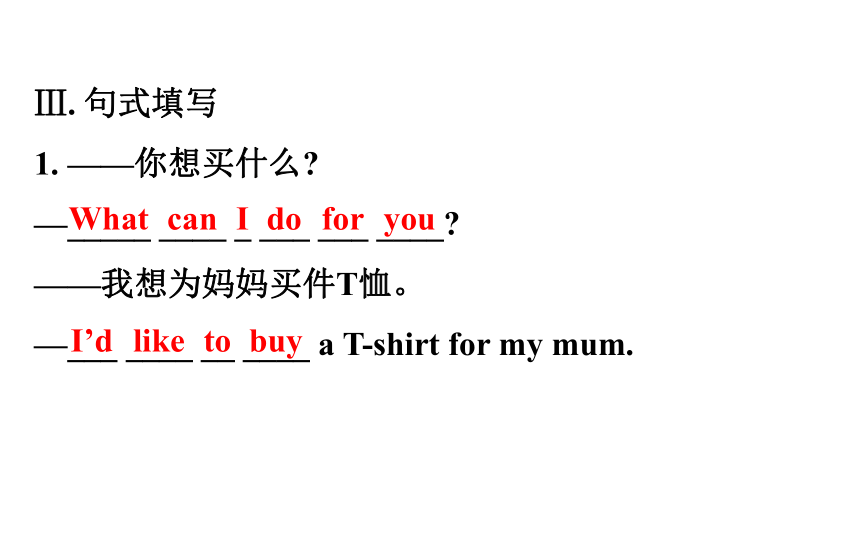
文档简介
课件146张PPT。七年级下册
Modules 5~8Ⅰ. 单词记忆
【核心速记】
1. _______ n. 市场
2. ____ v. aux. 可以; 可能
3. _____ n. 价格marketmayprice4. _____ adj. 新鲜的
5. _________ n. 有利条件; 优势
6. ________ v. 比较
7. ______ v. 收到; 接到
8. ______ adj. 几个; 一些
9. _____ adj. 营业的; 开放的freshadvantagecomparereceiveseveralopen10. ______ prep. 越过
11. _____ v. 穿过
12. ______ n. 广场
13. _______ adj. 著名的
14. _____ v. 结束; 完成
15. _____ adj. 严格的; 严厉的acrosscrosssquarefamousfinishstrict16. ______ n. 村庄
17. ___________ adj. 舒适的; 舒服的
18. _____ v. 推
19. _____ v. 进入
20. _____ adv. 也(不)
21. ______ adj. 睡着的
22. ______ v. 返回; 归还
23. _______ prep. 无; 没有villagecomfortablepushentereitherasleepreturnwithout【构词串记】
1. certain adj. →________ adv. 当然; 行
2. sell v. →____ n. 降价出售
3. safe adj. →_____ adv. 安全地
→______ n. 安全
4. shop v. →________ n. 购物
5. tour n. →______ n. 游客certainlysalesafelysafetyshoppingtourist6. three(基数词) →_____ num. 第三
7. paint v. →________ n. 油画; 绘画
8. clear adj. →______ adv. 清楚地; 清晰地
9. high adj. →______ n. 高度
10. friend n. →_______ adj. 友好的thirdpaintingclearlyheightfriendly11. difficult adj. →________ n. 困难
12. bore v. →______ adj. 厌烦的; 厌倦的
→______ adj. 令人厌烦的
13. comfort v. &n.
→___________ adj. 舒适的; 舒服的
14. decide v. →_______ n. 决定difficultyboredboringcomfortabledecisionⅡ. 短语快译
1. 试穿 ______
2. 别急; 稍等一会 ____________
3. 半价 _________
4. 为……付款; 支付 _______
5. ……之一 ______try onwait a minutehalf pricepay forone of6. 外出; 游玩 ______
7. 总有一天 _______
8. 沿着……走 _______________
9. 乘坐地铁去…… ________________________
10. 沿着…… _____________
11. 拿起; 举起 _______
12. 因为 _________go outone daygo/walk along. . .take the underground to. . .go up/down. . .pick upbecause of13. 散步 ____________
14. 从前 _______________
15. 指着…… _______
16. 破碎 ________go for a walkonce upon a timepoint atin piecesⅢ. 句式填写
1. ——你想买什么?
—_____ ____ _ ___ ___ ____?
——我想为妈妈买件T恤。
—___ ____ __ ____ a T-shirt for my mum. WhatcanIdoforyouI’dliketobuy2. ——你能告诉我去王府井大街的路吗?
—____ ____ ___ ___ ___ ____ __ Wangfujing Dajie?
——横穿……, 沿着……走, 在左边第三条街向左拐。
—___ ______. . . , ___ _____. . . and ____ ___ at the
third street on the left.
3. 为什么不问问那边的警察呢?
_____ ___ ___ the policeman over there?CanyoutellmethewaytoGoacrossgoalongturnleftWhynotask4. 当你累了的时候, 参观伦敦最好的方式就是乘船。
______ you are tired, the best way __ ___ London is ___
boat.
5. ——你出生在哪儿?
—Where _____ you _____?
——我出生在山西省的一个小村庄里。
—I ____ _____ in a small ______ in Shanxi ________. WhentoseebywerebornwasbornvillageProvince6. 她拿起那个大碗, 但她不喜欢它——它很热。
She ______ ___ the very big bowl but she ______ ____
it—it ____ very hot. pickedupdidn’tlikewas考点1 What can I do for you?
你想买什么?(Module 5, P26)【考点对接】
①(2016·黔西南州中考)—What can I do for you?
—______.
A. OK B. I want to buy a sweater
C. I’m fine D. I’m afraid I can’t【解析】选B。考查情景交际。问句What can I do for you?是服务用语。理解为“你买点什么?”答语“我想买件毛衣。”最恰当, 故选B。②—______, sir?
—Yes. I want a T-shirt.
A. Can I help you B. Can you help me
C. What can you do for me D. What do you want
【解析】选A。考查情景交际。根据答语判断问句是售货员常用的服务用语“Can I help you?”故选A。【知识归纳】
(1)What can I do for you?相当于Can I help you?是情景交际用语, 谈话地点多为餐馆、商店及图书馆等场所, 通常用于服务员主动询问顾客是否需要帮助。(2)回答时, 常用“I’d like some. . . / I’d like to buy. . . / I want to buy. . . ”等。例如:
—What can I do for you?你想买什么?
—I’d like a pair of shoes. 我想要一双鞋。考点2 Also paying over the Internet isn’t always safe.
通过互联网支付也不总是安全的。(Module 5, P28)
?over prep. 通过; 超过【考点对接】选词填空(over/through/across)
①There was an old stone bridge ____the river.
②It’s dangerous to go ______the road when the traffic
light is red.
③The sunshine often shines _______ the window into
the living room. overacrossthrough【知识归纳】across, through和over的辨析①Look left and right before you go across the street.
过马路前你要左右看。
②The journey through the jungle was dangerous.
穿过丛林的旅行充满了危险。
③We must go over the mountain.
我们必须越过那座山。考点3 —Could you tell me how to get to the National Stadium?你能告诉我怎样到达国家体育馆吗?
—Sure! Go along the street and you’ll see an underground station. 当然!沿着这条路走, 你会看到一个地铁站。(Module 6, P32)
?问路与指路【考点对接】
①—Could you tell me______we will go?
—Oh, no. The place is a secret before we get there.
when B. where C. why D. how
【解析】选B。考查疑问词辨析。根据答语: “哦, 不。在我们到那之前, 这个地方是个秘密。”可知问句询问的是地点。故选B。②(2017·西宁中考)—Excuse me, can you tell me where the nearest bank is, please?
—______Oh yes!It’s past the post office, next to a big market.
A. You’re welcome.
B. Oh, I beg your pardon?
C. Umm. . . , let me think.
D. What do you mean?【解析】选C。考查情景交际。句意: ——打扰一下, 你能告诉我最近的银行在哪里吗?——嗯, 让我想想。哦, 对了, 过了邮局, 它在一个大市场旁边。You’re welcome. 不用谢; Oh, I beg your pardon?再说一遍好吗; Umm. . . , let me think. 嗯, 让我想想; What do you mean?你是什么意思?由答语后一分句意思知, 应答者应是在思考过后回答了发话者问路的请求。故选C。【知识归纳】
(1)常见的问路句型:
①Could you please tell me where. . . is?
②Could you please tell me how to get to. . . ?
③Could you please tell me how I can get to. . . ?④Where is. . . , please?
⑤Could you please tell me the way to. . . ?
⑥Which is the way to. . . ?
⑦Is there. . . near here?(2)常用的指路句型:
①It’s about. . . meters from here.
它离这儿大约有……米。
②Walk on and turn left/right.
向前走, 然后向左/右拐。③Turn left/right at the first crossing.
=Take the first crossing on the left/right.
在第一个路口向左/右转。
④You can take the No. 7 bus. 你可以乘坐7路公交车。考点4 She picked up the very big bowl but she didn’t like it.
她拿起那个大碗, 但她不喜欢它。(Module 8, P48)
?pick up拿起; 举起【考点对接】
①(2017·德州模拟)—Do you______your daughter after school?
—No. She comes back home on the school bus.
A. pick up B. look after
C. drop in D. send for【解析】选A。考查动词词组辨析。句意: ——放学后你去______你女儿吗?——不。她坐校车回家。pick up“捡起, 接送”, look after“照顾”, drop in“顺便走访”, send for“派人去叫”。根据题干意思, 应该理解为“接送”女儿。故选A。②她到法国居住后很快就学会了法语。
She soon ______ ___ French when she went to live in France. pickedup【知识归纳】
pick up“拿起; 举起”是由动词加副词构成的动词短语。代词作宾语时, 需要放在动词与副词之间; 若名词作宾语, 既可以放在二者之间, 也可以放在动词短语之后。【拓展延伸】pick up的一词多义①I pick up my sister from her school. 我到学校接妹妹。
②A good sleep may help you pick up weight.
好的睡眠可以帮助你恢复体重。
③My brother picked up a lot of information from his classmates. 我哥哥偶然从同学那儿得到许多信息。
④His computer picked up a virus.
他的电脑感染上了病毒。考点5 It was not comfortable either.
它也不是很舒适。(Module 8, P50)
?either adv. 也(不)【考点对接】
①如果你不去, 我也不去。
If you don’t go there, I shall not go, _____. either②(2017·呼和浩特中考)______Lucy______you can’t go to the party. One of you has to stay at home to look after your grandma.
A. Neither; nor B. Either; or
C. Not only; but also D. Both; and【解析】选B。考查连词短语辨析。句意: 或者露西或者你不能参加聚会。你们中有一个必须留在家照顾你们的奶奶。either. . . or或者……或者……。故选B。③(2016·眉山中考)Unfortunately I was sitting at the table with smokers on______side of me.
A. either B. both C. other D. all
【解析】选A。考查形容词辨析。句意: 不幸的是, 我坐在桌子旁边, 身边两个人都抽烟。either两者中任一个, 后面跟名词单数。both两者都, 后面加名词复数。故选A。【知识归纳】either的不同词性及用法①They didn’t trust me, you didn’t trust me either.
他们不信任我, 你也不信任我。
②You may sit on either side of the table.
你可以坐在桌子两边的任一边。③I don’t agree with either of you on these questions.
在这些问题上, 你们两个我都不同意。
④She is coming either today or tomorrow.
她不是今天就是明天来。【要点备选】
考点1 May I try it on?
我能试穿一下吗?(Module 5, P26)
?may v. aux. 可以; 可能【考点对接】
①银河系中也许有几百万个世界。
There ____ ___ millions of worlds in the Milky Way Galaxy. maybe②(2017·达州中考)—May we leave the classroom now?
—No, you______. You______to leave until the bell rings.
A. needn’t; aren’t allowed B. may not; are allowed
C. mustn’t; aren’t allowed D. can’t; are allowed【解析】选C。考查情态动词及连词until的用法。may开头的疑问句, 否定回答用mustn’t或者can’t; 最后一句的句意为: 直到铃声响起你们才能离开。not. . . until意为“直到……才……”, 故选C。③(2016·河南中考)—You look very pretty, if I______ say so.
—Thanks a lot for saying that.
A. must B. may C. will D. have to【解析】选B。考查情态动词辨析。must必须; may可能; will将要; have to必须, 不得不。句意: ——如果我可以这样说, 你看起来很漂亮。——谢谢你这么说。if I may say so是插入语。故选B。【知识归纳】may的用法
(1)may表示许可或征求对方的意见, 意为“可以”。例如:
①You may go now. 现在你可以走了。
②May I use your computer?我用一下你的电脑可以吗?(2)回答以may开头的一般疑问句。例如:
—May I smoke here?我可以在这儿抽烟吗?
—Yes, you may. /Yes, please. 请抽吧。(肯定回答)
—No, you can’t. /No, you mustn’t. /No, you’d better not.
请不要抽烟。(否定回答)(3)may表示猜测, 通常只用于陈述句。例如:
You may be right. 你可能是对的。
(4)may表示祝愿, 意为“祝……, (但愿)”。例如:
May you be happy!祝你幸福!考点2 May I try it on?
我能试穿一下吗?(Module 5, P26)
?try v. 尝试; 试穿; 品尝【考点对接】
①我可以试穿一下这双鞋吗?
May I ___ ___ this pair of shoes?
②我会设法尽可能多储蓄。
I will ___ __ ____ as much as I can. tryontrytosave③我试着用她的本族语和她说话。
I _____ ________ to her in her native tongue.
④他们正在试验那种新方法。
They are ______ ___ the new method. triedspeakingtryingout⑤As soon as she______at home, Sally knew she had bought the wrong dress.
A. handed it in B. tried it on
C. cut it out D. made it up
【解析】选B。考查动词短语的辨析。句意: 萨利一到家试穿了连衣裙, 她就知道她买错了。表示“试穿它”, 应用try it on。故选B。【知识归纳】
(1)try作动词, 意为“试图, 努力; 试用”。
①try to do与try doing的区别。②try作动词时, 构成的常用短语: try one’s best(to do sth. )竭尽全力(做某事); try on“试穿”; try out“试验”; try for“谋求, 争取”。
(2)try作名词, 意为“尝试, 努力”。常用短语: have a try试一下。例如:
Let me have a try. 让我试一试。考点3 There are many new ways of shopping, and online shopping is one of them. 有许多种新的购物方式, 网购是其中之一。(Module 5, P28)
?one of……之一【考点对接】
①One of the ______(apple)has gone bad and he has to
throw it away.
②There are three mobile phones on the teacher’s desk
and one of_____ is Jim’s. apples them③(2017·襄阳中考)—China is over 5000 years old. It’s one of______countries in the world.
—Yes. It has much______history than the USA.
A. old; long B. older; longer
C. older; the longest D. the oldest; longer【解析】选D。考查形容词的比较等级。句意: ——中国有5 000多年的历史。它是世界上最古老(the oldest)的国家之一。——是的, 它比美国历史长(longer)得多。one of+the+形容词的最高级(oldest)+名词复数; 由答语中的than可知应该用long的比较级longer。故选D。【知识归纳】
(1)one of后面接复数代词的宾格形式或名词复数。例如:
one of us“我们中的一个”; one of the students“学生之一”(2)one of短语作主语时, 谓语动词用单数形式。例如:
I have some friends. One of them is good at dancing.
我有一些朋友。其中一个擅长跳舞。(3)one of+the+形容词最高级+名词复数, 意为“最……之一”。例如:
Beijing is one of the biggest cities in China.
北京是中国最大的城市之一。考点4 First, you choose something—clothes, tickets, a mobile phone, even a new computer—and pay for it. 首先, 你选择东西——衣服、票、手机, 甚至一台新电脑——付钱。(Module 5, P28)
?pay v. 支付; 付钱【考点对接】
①(2016·新疆生产建设兵团中考)I spent thirty yuan on
this ticket. (改为同义句)
I ____ thirty yuan ___ this ticket. paidfor②(2017·南京模拟)I______$300 for the bike.
A. took B. spent C. cost D. paid
【解析】选D。考查动词辨析。句意: 这辆自行车我花了300美元。pay, 付钱, 常用短语pay some money for sth. “为……付钱”; take, 花费, 其主语是做某事; spend, 花费, 其主语是人, spend. . . doing sth, 是固定用法, 意为“花费……做某事”。cost主语为物, 因此选D。【知识归纳】pay的常用短语
(1)pay(sb. )money for sth. 意为“付钱(给某人)买……”。例如:
I paid the shopkeeper ten yuan for the book.
我向店主付了10元钱买这本书。(2)pay for sth. 意为“付……的钱”。例如:
I have to pay for the lost book.
我不得不赔丢失的书款。
(3)pay for sb. 意为“替某人付钱”。例如:
Shall I pay for you?我替你付款好吗?(4)pay sb. 意为“付钱给某人”。例如:
They pay us every month. 他们每月给我们报酬。
(5)pay money back意为“还钱”。例如:
May I borrow 12 yuan from you? I’ll pay it back next week.
你能借给我12块钱吗?我下周还你。【妙辨异同】pay与spend的辨析
+pay+ +for sth.
+spend+ / + on sth. /(in)doing sth. 考点5 Then you receive it a few days later by post.
几天后你就收到邮件了。(Module 5, P28)
?receive v. 收到; 接到【考点对接】
①我在20岁生日时收到了许多礼物。
On my twentieth birthday I ________ many gifts.
②亚当收到了礼物, 但没有接受。
Adam ________ the present, but he didn’t ______ it. receivedreceivedaccept【妙辨异同】receive和accept的辨析 receive accept考点6 Why not ask the policeman over there?
为什么不问问那边的警察呢?(Module 6, P32)
?Why not do sth. ?为什么不做某事呢?【考点对接】
(2017·齐齐哈尔中考)It is raining outside. Why not ______ an umbrella?
A. to take B. take C. taking
【解析】选B。考查动词的非谓语形式。句意: 外面正在下雨。为什么不拿把雨伞呢?Why not后接动词原形。故选B。【知识归纳】
“Why not+动词原形?”意为“为什么不做某事呢?”相当于“Why don’t you do sth. ?”表示提建议。其答语为: That’s a good idea. /That sounds great. 例如:—Why not have a picnic this afternoon?
今天下午为什么不去野餐呢?
—That’s a good idea. 那是个好主意。考点7 We’re standing opposite the National Gallery, a famous museum with lots of famous paintings. 我们正站在国家美术馆——一座有许多名画的著名博物馆的对过。(Module 6, P34)
?famous adj. 著名的【考点对接】
①(2016·海南中考)—Hainan______its blue sky and fresh air.
—So it is. That’s why more and more visitors spend their holidays here.
A. is weak in B. is famous for
C. is used to【解析】选B。考查短语辨析。be weak in意为“不擅长某事”; be famous for意为“因……而著名”; be used to意为“习惯于……”; 句意: ——海南因它的蓝天和清新空气而著名。——确实是。这就是越来越多的人来这里度假的原因。故选B。②她作为作家比作为歌手名声要大。
She was _____ _______ __ a writer than as a singer. morefamousas【妙辨异同】be famous的两种搭配 ①Beijing is famous for its long history.
北京因它悠久的历史而著名。
②She wants to be famous as a movie star.
她想当一个电影明星而成名。考点8 Then turn left and go down the street to the bus stop.
然后左转, 沿着大街到公交车站。(Module 6, P36)
?stop n. 车站 v. 停止【考点对接】
①(2017·河南模拟)She reached the top of the hill and stopped______on a big rock by the side of the path.
A. to have rested B. resting
C. to rest D. rest【解析】选C。考查stop的用法。由题意可知, 她到了山顶, 停下来在一个路边的大石头上休息。因此, 应选择“stop to do sth. 停下来去做另一件事”。故选C。②(2016·襄阳中考)—I think you should stop______him in English.
—I see. He can’t understand English at all. Let me try in French.
A. talking to B. to talk to
C. talk to D. to talking to【解析】选A。考查短语辨析。句意: ——我觉得你应该停止和他用英语交谈。——我知道了。他根本不懂英语。那让我用法语试试。stop doing sth. 意为: 停止正进行的某事。故选A。【知识归纳】
(1)stop作名词, 意为“车站”。例如: Please get off the bus at the next stop. 请在下个车站下公交车。(2)stop作动词, 意为“停止”。常用短语:
①stop doing sth. 意为“停止做某事”, 指停止正在做的事情。例如:
It’s time for class. Stop talking.
该上课了。停止说话。②stop to do sth. 意为“停下来去做某事”, 指停下来去做另外一件事。例如:
We have walked for two hours. Let’s stop to have a rest.
我们已经走了两个小时了。让我们停下来休息一会儿吧。③stop. . . from doing sth. 意为“阻止……做某事”。例如:
The heavy rain stopped us from coming on time.
这场大雨阻止了我们按时来这儿。考点9 Then she noticed a little house.
然后她看见了一所小房子。(Module 8, P48)
?notice v. 注意到【考点对接】
①Did you notice his hand _______(shake)when he heard
what you said?
②We notice the room _______ (clean). Who did it?
③Did you notice anyone ____(take)the book away?
④Jack was always noticed ________(watch)TV this
night. shakingcleanedtaketo watch【知识归纳】
(1)notice用作名词, 意为“布告, 公告, 启事”, 是可数名词。例如:
These rules can’t be changed without notice.
这些规则没有通知不可以被更改。(2)notice用作动词, 意为“注意到”。其常用结构: notice sb. do sth. “注意到某人做某事”; notice sb. doing sth. “注意到某人正在做某事”; notice sth. done“看到某事被做(已经完成)”; be noticed to do sth. “被注意到做某事”。例如: ①I didn’t notice you come in.
我没有注意到你进来。
②I noticed her standing behind me.
我注意到她正站在我后面。③No one noticed the flowers on the table changed.
没有人注意到桌子上的花被换过。
④He was noticed to leave the house an hour ago.
一小时前有人注意到他离开了这所房子。考点10 Didn’t anyone live in the house?
难道没有人住在房子里吗?(Module 8, P48)
?否定疑问句【考点对接】
—Didn’t you enjoy the performance last night?
—______. It was less wonderful than expected.
A. Yes, I did B. No, I didn’t
C. Yes, I didn’t D. No, I did【解析】选B。考查否定疑问句。句意: ——难道你不喜欢昨天晚上的演出吗?——是的, 我不喜欢。没有我期望的那么好。否定疑问句的答语据实回答, 在形式上与一般疑问句的答语一样。故选B。【知识归纳】
(1)否定疑问句即否定形式的一般疑问句。否定疑问句可以表示说话者惊异的情绪、责难的口吻或赞叹; 也可以表示说话者的某种建议、邀请、请求或看法等。例如:
①Can’t he drive?他不会开车吗?
②Don’t you think so?难道你不这么认为吗?(2)否定疑问句的答语根据实际情况进行回答。例如:
①—Don’t you know English?你不懂英语吗?
—Yes, I do. 不, 我懂。
②—Isn’t she a nurse?她不是一位护士吗?
—No, she isn’t. 是的, 她不是。考点11 Very soon she was asleep in it.
她很快(在床上)睡着了。(Module 8, P50)
?asleep adj. 睡着的【考点对接】选词填空sleep /asleep /sleepy / sleeping
①The child fell ______ in its mother’s arms.
②(2017·青岛中考)Don’t make any noise. Your
grandfather is _______ (sleep)in bed.
③He has to _____ in a day and work at night.
④(2017·宿迁中考)Bob stayed up late last night and now
he feels ______ (sleep). asleepsleepingsleepsleepy【妙辨异同】asleep, sleep, sleepy和sleeping的辨析【图解助记】考点12 The Three Bears returned.
三只熊回来了。(Module 8, P50)
?return v. 返回; 归还【考点对接】
①(2016·海南中考)—How long can I keep this dictionary?
—Two weeks. You must______it on time.
A. collect B. call C. return【解析】选C。考查动词词义辨析。collect收集; call打电话; return归还。句意: ——我能借这本词典多长时间?——两周。你必须按时归还。因此答案选C。②(2016·南通中考)Mum will not let Simon go out next
time unless he _______ (return)home before dark. returns【知识归纳】
(1)return意为“返回”, 相当于“go back/get back/come back。常用return to+地点, 当地点用副词表示时, 省略介词to。(注意: return已含有back的意思, 后不可再跟back)例如:
Mr Brown did not return home until eleven o’clock.
布朗先生直到十一点才回到家。(2)return意为“归还”, 相当于“give back”, return sth. to sb. 意为“把某物还给某人”。例如:
①I have returned the dictionary. 我已经归还了字典。
②You should return the book to Dick on time.
你应该按时把书还给迪克。语法点一: 特殊疑问句
——见语法专项部分P313
考点1: 特殊疑问句的结构: 特殊疑问词+一般疑问句结构+其他?考点2: 常用的疑问词/短语有: what(什么), who(谁), which(哪一个); whose(谁的), when(何时), where(何地), how(怎么); why(为什么); how many/much(多少); how often(多久一次); how soon(多久); how long(多长时间; 长度多少); how far(多远)【强化训练】
1. (2017·哈尔滨中考)—______is it from your house to the bookstore?
—It’s about fifteen minutes’ walk.
A. How long B. How far C. How often【解析】选B。考查特殊疑问词。句意: ——从你家到书店有多远?——大约15分钟的步行(路程)。How long多长; How far多远; How often多久一次。由答语可知, 空格处应问“路程多远”。故选B。2. (2017·南京中考)—Millie, ______do you take the course in DIY?
—Every Saturday afternoon.
A. how long B. how far
C. how much D. how often【解析】选D。考查疑问词组辨析。问句意为“米莉, 你______去上“自己动手做”的课程”, 答句意为“每周六下午”。答句是表示“频率”的, 因此用how often提问, 表示“多长时间一次”。故选D。3. (2017·长春中考)—The Changchun subway will be in use. ______will it take you to get to school on it?
—Only ten minutes. It’ll be quick and convenient.
A. How much B. How many
C. How often D. How long【解析】选D。考查特殊疑问词组。由答语Only ten minutes. 可知前句对时间提问。就“多长时间”进行提问, 应使用how long。问句句意: 你乘坐地铁去上学需要多长时间?故选D。4. (2017·武威、白银中考)Can anyone suggest______to go for lunch?
A. why B. what C. who D. where
【解析】选D。考查疑问词用法辨析。why为什么; what什么; who谁; where在哪里。由句意: 大家建议去哪里吃午饭?可知选D。5. (2017·无锡中考)I don’t care how you do the job. I only care______it can be done. Just give me a date!
A. where B. when C. what D. why
【解析】选B。考查特殊疑问词。句意: 由下文“你只需给我个日期即可”可知我不关心你如何干这个工作, 我只关心何时(when)能完成。故选B。句型转换
1. (2015·上海中考)Mary paid about $1, 500 for a trip to
Europe with her mother. (对画线部分提问)
_____ _____ did Mary pay for a trip to Europe with her
mother?Howmuch2. (2017·重庆·B卷)Li Hua usually goes to the library
after school. (对画线部分提问)
_____ ____ Li Hua usually do after school?
3. (2015·安顺中考)Amy studied in a university for
several years. (对画线部分提问)
_____ ____ did Amy study in a university?WhatdoesHowlong4. (2015·济南中考)The supermarket is two miles from
the hotel. (对画线部分提问)
_____ ___ is the supermarket from the hotel?
5. (2015·黔西南州中考)The girl will fly to Canada
in three days. (对画线部分提问)
_____ ____ will the girl fly to Canada?HowfarHowsoon6. (2015·乐山中考)I’d like to order a hamburger and an
orange juice. (对画线部分提问)
_____ ______ you like to order?
7. (2016·重庆中考·A卷)Dave was making a model plane
in the classroom at that time. (对画线部分提问)
______ ____ Dave making a model plane at that time?WhatwouldWherewas语法点二: 方位的表达方式
——见语法专项部分P271
考点: 常见的方位介词: on the left/right; in front of; at the end of; opposite; on the corner; between. . . and. . . 【强化训练】
1. (2016·北京中考)Paul’s mother is a nurse. She works ______a hospital.
A. with B. on C. of D. in
【解析】选D。考查介词用法。句意: 保罗的母亲是护士。她在医院工作。表示“在医院”用“in a hospital”。故选D。2. (2016·济南中考)I often go to the bookstore ______ Quancheng Road although it’s crowded.
A. on B. for C. from D. between【解析】选A。考查介词用法辨析。句意: 我经常去泉城路上的书店, 尽管那里很拥挤。on“在……表面上”; for“为了”; from“来自”; between“在两者之间”。根据生活经验可知: 在某条路上应用介词on。故选A。 3. Mr Green’s office is______the 26th floor. You can take the lift there.
A. at B. in C. on D. for
【解析】选C。考查介词。表示在第几层楼用介词on。 4. —Excuse me. Could you tell me the way______the train station?
—Go down this street and turn left. Then you’ll see it.
A. to B. of C. in D. at
【解析】选A。考查介词用法。句意: ——你能告诉我______火车站的路吗?the way to“去往……的路”, 为固定短语, 故选A。5. (2017·苏州中考)Nora opened the box. To her surprise, ______it was a gold watch.
A. outside B. inside
C. beside D. behind
【解析】选B。考查介词的辨析。句意: 劳拉打开了盒子, 令她惊奇的是, 在里面是一块金表。表示“在……里面”应用inside。故选B。6. (2017·无锡中考)There’s one taken by the River Seine______these photos. Can you find it out?
A. except B. including
C. between D. among【解析】选D。考查介词。except除了; including包括; between在(两者)之间; among在(三者或三者以上)之间。句意: 在这些照片中(among), 有一张是在塞纳河边拍的, 你能找出来吗?故选D。
Modules 5~8Ⅰ. 单词记忆
【核心速记】
1. _______ n. 市场
2. ____ v. aux. 可以; 可能
3. _____ n. 价格marketmayprice4. _____ adj. 新鲜的
5. _________ n. 有利条件; 优势
6. ________ v. 比较
7. ______ v. 收到; 接到
8. ______ adj. 几个; 一些
9. _____ adj. 营业的; 开放的freshadvantagecomparereceiveseveralopen10. ______ prep. 越过
11. _____ v. 穿过
12. ______ n. 广场
13. _______ adj. 著名的
14. _____ v. 结束; 完成
15. _____ adj. 严格的; 严厉的acrosscrosssquarefamousfinishstrict16. ______ n. 村庄
17. ___________ adj. 舒适的; 舒服的
18. _____ v. 推
19. _____ v. 进入
20. _____ adv. 也(不)
21. ______ adj. 睡着的
22. ______ v. 返回; 归还
23. _______ prep. 无; 没有villagecomfortablepushentereitherasleepreturnwithout【构词串记】
1. certain adj. →________ adv. 当然; 行
2. sell v. →____ n. 降价出售
3. safe adj. →_____ adv. 安全地
→______ n. 安全
4. shop v. →________ n. 购物
5. tour n. →______ n. 游客certainlysalesafelysafetyshoppingtourist6. three(基数词) →_____ num. 第三
7. paint v. →________ n. 油画; 绘画
8. clear adj. →______ adv. 清楚地; 清晰地
9. high adj. →______ n. 高度
10. friend n. →_______ adj. 友好的thirdpaintingclearlyheightfriendly11. difficult adj. →________ n. 困难
12. bore v. →______ adj. 厌烦的; 厌倦的
→______ adj. 令人厌烦的
13. comfort v. &n.
→___________ adj. 舒适的; 舒服的
14. decide v. →_______ n. 决定difficultyboredboringcomfortabledecisionⅡ. 短语快译
1. 试穿 ______
2. 别急; 稍等一会 ____________
3. 半价 _________
4. 为……付款; 支付 _______
5. ……之一 ______try onwait a minutehalf pricepay forone of6. 外出; 游玩 ______
7. 总有一天 _______
8. 沿着……走 _______________
9. 乘坐地铁去…… ________________________
10. 沿着…… _____________
11. 拿起; 举起 _______
12. 因为 _________go outone daygo/walk along. . .take the underground to. . .go up/down. . .pick upbecause of13. 散步 ____________
14. 从前 _______________
15. 指着…… _______
16. 破碎 ________go for a walkonce upon a timepoint atin piecesⅢ. 句式填写
1. ——你想买什么?
—_____ ____ _ ___ ___ ____?
——我想为妈妈买件T恤。
—___ ____ __ ____ a T-shirt for my mum. WhatcanIdoforyouI’dliketobuy2. ——你能告诉我去王府井大街的路吗?
—____ ____ ___ ___ ___ ____ __ Wangfujing Dajie?
——横穿……, 沿着……走, 在左边第三条街向左拐。
—___ ______. . . , ___ _____. . . and ____ ___ at the
third street on the left.
3. 为什么不问问那边的警察呢?
_____ ___ ___ the policeman over there?CanyoutellmethewaytoGoacrossgoalongturnleftWhynotask4. 当你累了的时候, 参观伦敦最好的方式就是乘船。
______ you are tired, the best way __ ___ London is ___
boat.
5. ——你出生在哪儿?
—Where _____ you _____?
——我出生在山西省的一个小村庄里。
—I ____ _____ in a small ______ in Shanxi ________. WhentoseebywerebornwasbornvillageProvince6. 她拿起那个大碗, 但她不喜欢它——它很热。
She ______ ___ the very big bowl but she ______ ____
it—it ____ very hot. pickedupdidn’tlikewas考点1 What can I do for you?
你想买什么?(Module 5, P26)【考点对接】
①(2016·黔西南州中考)—What can I do for you?
—______.
A. OK B. I want to buy a sweater
C. I’m fine D. I’m afraid I can’t【解析】选B。考查情景交际。问句What can I do for you?是服务用语。理解为“你买点什么?”答语“我想买件毛衣。”最恰当, 故选B。②—______, sir?
—Yes. I want a T-shirt.
A. Can I help you B. Can you help me
C. What can you do for me D. What do you want
【解析】选A。考查情景交际。根据答语判断问句是售货员常用的服务用语“Can I help you?”故选A。【知识归纳】
(1)What can I do for you?相当于Can I help you?是情景交际用语, 谈话地点多为餐馆、商店及图书馆等场所, 通常用于服务员主动询问顾客是否需要帮助。(2)回答时, 常用“I’d like some. . . / I’d like to buy. . . / I want to buy. . . ”等。例如:
—What can I do for you?你想买什么?
—I’d like a pair of shoes. 我想要一双鞋。考点2 Also paying over the Internet isn’t always safe.
通过互联网支付也不总是安全的。(Module 5, P28)
?over prep. 通过; 超过【考点对接】选词填空(over/through/across)
①There was an old stone bridge ____the river.
②It’s dangerous to go ______the road when the traffic
light is red.
③The sunshine often shines _______ the window into
the living room. overacrossthrough【知识归纳】across, through和over的辨析①Look left and right before you go across the street.
过马路前你要左右看。
②The journey through the jungle was dangerous.
穿过丛林的旅行充满了危险。
③We must go over the mountain.
我们必须越过那座山。考点3 —Could you tell me how to get to the National Stadium?你能告诉我怎样到达国家体育馆吗?
—Sure! Go along the street and you’ll see an underground station. 当然!沿着这条路走, 你会看到一个地铁站。(Module 6, P32)
?问路与指路【考点对接】
①—Could you tell me______we will go?
—Oh, no. The place is a secret before we get there.
when B. where C. why D. how
【解析】选B。考查疑问词辨析。根据答语: “哦, 不。在我们到那之前, 这个地方是个秘密。”可知问句询问的是地点。故选B。②(2017·西宁中考)—Excuse me, can you tell me where the nearest bank is, please?
—______Oh yes!It’s past the post office, next to a big market.
A. You’re welcome.
B. Oh, I beg your pardon?
C. Umm. . . , let me think.
D. What do you mean?【解析】选C。考查情景交际。句意: ——打扰一下, 你能告诉我最近的银行在哪里吗?——嗯, 让我想想。哦, 对了, 过了邮局, 它在一个大市场旁边。You’re welcome. 不用谢; Oh, I beg your pardon?再说一遍好吗; Umm. . . , let me think. 嗯, 让我想想; What do you mean?你是什么意思?由答语后一分句意思知, 应答者应是在思考过后回答了发话者问路的请求。故选C。【知识归纳】
(1)常见的问路句型:
①Could you please tell me where. . . is?
②Could you please tell me how to get to. . . ?
③Could you please tell me how I can get to. . . ?④Where is. . . , please?
⑤Could you please tell me the way to. . . ?
⑥Which is the way to. . . ?
⑦Is there. . . near here?(2)常用的指路句型:
①It’s about. . . meters from here.
它离这儿大约有……米。
②Walk on and turn left/right.
向前走, 然后向左/右拐。③Turn left/right at the first crossing.
=Take the first crossing on the left/right.
在第一个路口向左/右转。
④You can take the No. 7 bus. 你可以乘坐7路公交车。考点4 She picked up the very big bowl but she didn’t like it.
她拿起那个大碗, 但她不喜欢它。(Module 8, P48)
?pick up拿起; 举起【考点对接】
①(2017·德州模拟)—Do you______your daughter after school?
—No. She comes back home on the school bus.
A. pick up B. look after
C. drop in D. send for【解析】选A。考查动词词组辨析。句意: ——放学后你去______你女儿吗?——不。她坐校车回家。pick up“捡起, 接送”, look after“照顾”, drop in“顺便走访”, send for“派人去叫”。根据题干意思, 应该理解为“接送”女儿。故选A。②她到法国居住后很快就学会了法语。
She soon ______ ___ French when she went to live in France. pickedup【知识归纳】
pick up“拿起; 举起”是由动词加副词构成的动词短语。代词作宾语时, 需要放在动词与副词之间; 若名词作宾语, 既可以放在二者之间, 也可以放在动词短语之后。【拓展延伸】pick up的一词多义①I pick up my sister from her school. 我到学校接妹妹。
②A good sleep may help you pick up weight.
好的睡眠可以帮助你恢复体重。
③My brother picked up a lot of information from his classmates. 我哥哥偶然从同学那儿得到许多信息。
④His computer picked up a virus.
他的电脑感染上了病毒。考点5 It was not comfortable either.
它也不是很舒适。(Module 8, P50)
?either adv. 也(不)【考点对接】
①如果你不去, 我也不去。
If you don’t go there, I shall not go, _____. either②(2017·呼和浩特中考)______Lucy______you can’t go to the party. One of you has to stay at home to look after your grandma.
A. Neither; nor B. Either; or
C. Not only; but also D. Both; and【解析】选B。考查连词短语辨析。句意: 或者露西或者你不能参加聚会。你们中有一个必须留在家照顾你们的奶奶。either. . . or或者……或者……。故选B。③(2016·眉山中考)Unfortunately I was sitting at the table with smokers on______side of me.
A. either B. both C. other D. all
【解析】选A。考查形容词辨析。句意: 不幸的是, 我坐在桌子旁边, 身边两个人都抽烟。either两者中任一个, 后面跟名词单数。both两者都, 后面加名词复数。故选A。【知识归纳】either的不同词性及用法①They didn’t trust me, you didn’t trust me either.
他们不信任我, 你也不信任我。
②You may sit on either side of the table.
你可以坐在桌子两边的任一边。③I don’t agree with either of you on these questions.
在这些问题上, 你们两个我都不同意。
④She is coming either today or tomorrow.
她不是今天就是明天来。【要点备选】
考点1 May I try it on?
我能试穿一下吗?(Module 5, P26)
?may v. aux. 可以; 可能【考点对接】
①银河系中也许有几百万个世界。
There ____ ___ millions of worlds in the Milky Way Galaxy. maybe②(2017·达州中考)—May we leave the classroom now?
—No, you______. You______to leave until the bell rings.
A. needn’t; aren’t allowed B. may not; are allowed
C. mustn’t; aren’t allowed D. can’t; are allowed【解析】选C。考查情态动词及连词until的用法。may开头的疑问句, 否定回答用mustn’t或者can’t; 最后一句的句意为: 直到铃声响起你们才能离开。not. . . until意为“直到……才……”, 故选C。③(2016·河南中考)—You look very pretty, if I______ say so.
—Thanks a lot for saying that.
A. must B. may C. will D. have to【解析】选B。考查情态动词辨析。must必须; may可能; will将要; have to必须, 不得不。句意: ——如果我可以这样说, 你看起来很漂亮。——谢谢你这么说。if I may say so是插入语。故选B。【知识归纳】may的用法
(1)may表示许可或征求对方的意见, 意为“可以”。例如:
①You may go now. 现在你可以走了。
②May I use your computer?我用一下你的电脑可以吗?(2)回答以may开头的一般疑问句。例如:
—May I smoke here?我可以在这儿抽烟吗?
—Yes, you may. /Yes, please. 请抽吧。(肯定回答)
—No, you can’t. /No, you mustn’t. /No, you’d better not.
请不要抽烟。(否定回答)(3)may表示猜测, 通常只用于陈述句。例如:
You may be right. 你可能是对的。
(4)may表示祝愿, 意为“祝……, (但愿)”。例如:
May you be happy!祝你幸福!考点2 May I try it on?
我能试穿一下吗?(Module 5, P26)
?try v. 尝试; 试穿; 品尝【考点对接】
①我可以试穿一下这双鞋吗?
May I ___ ___ this pair of shoes?
②我会设法尽可能多储蓄。
I will ___ __ ____ as much as I can. tryontrytosave③我试着用她的本族语和她说话。
I _____ ________ to her in her native tongue.
④他们正在试验那种新方法。
They are ______ ___ the new method. triedspeakingtryingout⑤As soon as she______at home, Sally knew she had bought the wrong dress.
A. handed it in B. tried it on
C. cut it out D. made it up
【解析】选B。考查动词短语的辨析。句意: 萨利一到家试穿了连衣裙, 她就知道她买错了。表示“试穿它”, 应用try it on。故选B。【知识归纳】
(1)try作动词, 意为“试图, 努力; 试用”。
①try to do与try doing的区别。②try作动词时, 构成的常用短语: try one’s best(to do sth. )竭尽全力(做某事); try on“试穿”; try out“试验”; try for“谋求, 争取”。
(2)try作名词, 意为“尝试, 努力”。常用短语: have a try试一下。例如:
Let me have a try. 让我试一试。考点3 There are many new ways of shopping, and online shopping is one of them. 有许多种新的购物方式, 网购是其中之一。(Module 5, P28)
?one of……之一【考点对接】
①One of the ______(apple)has gone bad and he has to
throw it away.
②There are three mobile phones on the teacher’s desk
and one of_____ is Jim’s. apples them③(2017·襄阳中考)—China is over 5000 years old. It’s one of______countries in the world.
—Yes. It has much______history than the USA.
A. old; long B. older; longer
C. older; the longest D. the oldest; longer【解析】选D。考查形容词的比较等级。句意: ——中国有5 000多年的历史。它是世界上最古老(the oldest)的国家之一。——是的, 它比美国历史长(longer)得多。one of+the+形容词的最高级(oldest)+名词复数; 由答语中的than可知应该用long的比较级longer。故选D。【知识归纳】
(1)one of后面接复数代词的宾格形式或名词复数。例如:
one of us“我们中的一个”; one of the students“学生之一”(2)one of短语作主语时, 谓语动词用单数形式。例如:
I have some friends. One of them is good at dancing.
我有一些朋友。其中一个擅长跳舞。(3)one of+the+形容词最高级+名词复数, 意为“最……之一”。例如:
Beijing is one of the biggest cities in China.
北京是中国最大的城市之一。考点4 First, you choose something—clothes, tickets, a mobile phone, even a new computer—and pay for it. 首先, 你选择东西——衣服、票、手机, 甚至一台新电脑——付钱。(Module 5, P28)
?pay v. 支付; 付钱【考点对接】
①(2016·新疆生产建设兵团中考)I spent thirty yuan on
this ticket. (改为同义句)
I ____ thirty yuan ___ this ticket. paidfor②(2017·南京模拟)I______$300 for the bike.
A. took B. spent C. cost D. paid
【解析】选D。考查动词辨析。句意: 这辆自行车我花了300美元。pay, 付钱, 常用短语pay some money for sth. “为……付钱”; take, 花费, 其主语是做某事; spend, 花费, 其主语是人, spend. . . doing sth, 是固定用法, 意为“花费……做某事”。cost主语为物, 因此选D。【知识归纳】pay的常用短语
(1)pay(sb. )money for sth. 意为“付钱(给某人)买……”。例如:
I paid the shopkeeper ten yuan for the book.
我向店主付了10元钱买这本书。(2)pay for sth. 意为“付……的钱”。例如:
I have to pay for the lost book.
我不得不赔丢失的书款。
(3)pay for sb. 意为“替某人付钱”。例如:
Shall I pay for you?我替你付款好吗?(4)pay sb. 意为“付钱给某人”。例如:
They pay us every month. 他们每月给我们报酬。
(5)pay money back意为“还钱”。例如:
May I borrow 12 yuan from you? I’ll pay it back next week.
你能借给我12块钱吗?我下周还你。【妙辨异同】pay与spend的辨析
+pay+ +for sth.
+spend+ / + on sth. /(in)doing sth. 考点5 Then you receive it a few days later by post.
几天后你就收到邮件了。(Module 5, P28)
?receive v. 收到; 接到【考点对接】
①我在20岁生日时收到了许多礼物。
On my twentieth birthday I ________ many gifts.
②亚当收到了礼物, 但没有接受。
Adam ________ the present, but he didn’t ______ it. receivedreceivedaccept【妙辨异同】receive和accept的辨析 receive accept考点6 Why not ask the policeman over there?
为什么不问问那边的警察呢?(Module 6, P32)
?Why not do sth. ?为什么不做某事呢?【考点对接】
(2017·齐齐哈尔中考)It is raining outside. Why not ______ an umbrella?
A. to take B. take C. taking
【解析】选B。考查动词的非谓语形式。句意: 外面正在下雨。为什么不拿把雨伞呢?Why not后接动词原形。故选B。【知识归纳】
“Why not+动词原形?”意为“为什么不做某事呢?”相当于“Why don’t you do sth. ?”表示提建议。其答语为: That’s a good idea. /That sounds great. 例如:—Why not have a picnic this afternoon?
今天下午为什么不去野餐呢?
—That’s a good idea. 那是个好主意。考点7 We’re standing opposite the National Gallery, a famous museum with lots of famous paintings. 我们正站在国家美术馆——一座有许多名画的著名博物馆的对过。(Module 6, P34)
?famous adj. 著名的【考点对接】
①(2016·海南中考)—Hainan______its blue sky and fresh air.
—So it is. That’s why more and more visitors spend their holidays here.
A. is weak in B. is famous for
C. is used to【解析】选B。考查短语辨析。be weak in意为“不擅长某事”; be famous for意为“因……而著名”; be used to意为“习惯于……”; 句意: ——海南因它的蓝天和清新空气而著名。——确实是。这就是越来越多的人来这里度假的原因。故选B。②她作为作家比作为歌手名声要大。
She was _____ _______ __ a writer than as a singer. morefamousas【妙辨异同】be famous的两种搭配 ①Beijing is famous for its long history.
北京因它悠久的历史而著名。
②She wants to be famous as a movie star.
她想当一个电影明星而成名。考点8 Then turn left and go down the street to the bus stop.
然后左转, 沿着大街到公交车站。(Module 6, P36)
?stop n. 车站 v. 停止【考点对接】
①(2017·河南模拟)She reached the top of the hill and stopped______on a big rock by the side of the path.
A. to have rested B. resting
C. to rest D. rest【解析】选C。考查stop的用法。由题意可知, 她到了山顶, 停下来在一个路边的大石头上休息。因此, 应选择“stop to do sth. 停下来去做另一件事”。故选C。②(2016·襄阳中考)—I think you should stop______him in English.
—I see. He can’t understand English at all. Let me try in French.
A. talking to B. to talk to
C. talk to D. to talking to【解析】选A。考查短语辨析。句意: ——我觉得你应该停止和他用英语交谈。——我知道了。他根本不懂英语。那让我用法语试试。stop doing sth. 意为: 停止正进行的某事。故选A。【知识归纳】
(1)stop作名词, 意为“车站”。例如: Please get off the bus at the next stop. 请在下个车站下公交车。(2)stop作动词, 意为“停止”。常用短语:
①stop doing sth. 意为“停止做某事”, 指停止正在做的事情。例如:
It’s time for class. Stop talking.
该上课了。停止说话。②stop to do sth. 意为“停下来去做某事”, 指停下来去做另外一件事。例如:
We have walked for two hours. Let’s stop to have a rest.
我们已经走了两个小时了。让我们停下来休息一会儿吧。③stop. . . from doing sth. 意为“阻止……做某事”。例如:
The heavy rain stopped us from coming on time.
这场大雨阻止了我们按时来这儿。考点9 Then she noticed a little house.
然后她看见了一所小房子。(Module 8, P48)
?notice v. 注意到【考点对接】
①Did you notice his hand _______(shake)when he heard
what you said?
②We notice the room _______ (clean). Who did it?
③Did you notice anyone ____(take)the book away?
④Jack was always noticed ________(watch)TV this
night. shakingcleanedtaketo watch【知识归纳】
(1)notice用作名词, 意为“布告, 公告, 启事”, 是可数名词。例如:
These rules can’t be changed without notice.
这些规则没有通知不可以被更改。(2)notice用作动词, 意为“注意到”。其常用结构: notice sb. do sth. “注意到某人做某事”; notice sb. doing sth. “注意到某人正在做某事”; notice sth. done“看到某事被做(已经完成)”; be noticed to do sth. “被注意到做某事”。例如: ①I didn’t notice you come in.
我没有注意到你进来。
②I noticed her standing behind me.
我注意到她正站在我后面。③No one noticed the flowers on the table changed.
没有人注意到桌子上的花被换过。
④He was noticed to leave the house an hour ago.
一小时前有人注意到他离开了这所房子。考点10 Didn’t anyone live in the house?
难道没有人住在房子里吗?(Module 8, P48)
?否定疑问句【考点对接】
—Didn’t you enjoy the performance last night?
—______. It was less wonderful than expected.
A. Yes, I did B. No, I didn’t
C. Yes, I didn’t D. No, I did【解析】选B。考查否定疑问句。句意: ——难道你不喜欢昨天晚上的演出吗?——是的, 我不喜欢。没有我期望的那么好。否定疑问句的答语据实回答, 在形式上与一般疑问句的答语一样。故选B。【知识归纳】
(1)否定疑问句即否定形式的一般疑问句。否定疑问句可以表示说话者惊异的情绪、责难的口吻或赞叹; 也可以表示说话者的某种建议、邀请、请求或看法等。例如:
①Can’t he drive?他不会开车吗?
②Don’t you think so?难道你不这么认为吗?(2)否定疑问句的答语根据实际情况进行回答。例如:
①—Don’t you know English?你不懂英语吗?
—Yes, I do. 不, 我懂。
②—Isn’t she a nurse?她不是一位护士吗?
—No, she isn’t. 是的, 她不是。考点11 Very soon she was asleep in it.
她很快(在床上)睡着了。(Module 8, P50)
?asleep adj. 睡着的【考点对接】选词填空sleep /asleep /sleepy / sleeping
①The child fell ______ in its mother’s arms.
②(2017·青岛中考)Don’t make any noise. Your
grandfather is _______ (sleep)in bed.
③He has to _____ in a day and work at night.
④(2017·宿迁中考)Bob stayed up late last night and now
he feels ______ (sleep). asleepsleepingsleepsleepy【妙辨异同】asleep, sleep, sleepy和sleeping的辨析【图解助记】考点12 The Three Bears returned.
三只熊回来了。(Module 8, P50)
?return v. 返回; 归还【考点对接】
①(2016·海南中考)—How long can I keep this dictionary?
—Two weeks. You must______it on time.
A. collect B. call C. return【解析】选C。考查动词词义辨析。collect收集; call打电话; return归还。句意: ——我能借这本词典多长时间?——两周。你必须按时归还。因此答案选C。②(2016·南通中考)Mum will not let Simon go out next
time unless he _______ (return)home before dark. returns【知识归纳】
(1)return意为“返回”, 相当于“go back/get back/come back。常用return to+地点, 当地点用副词表示时, 省略介词to。(注意: return已含有back的意思, 后不可再跟back)例如:
Mr Brown did not return home until eleven o’clock.
布朗先生直到十一点才回到家。(2)return意为“归还”, 相当于“give back”, return sth. to sb. 意为“把某物还给某人”。例如:
①I have returned the dictionary. 我已经归还了字典。
②You should return the book to Dick on time.
你应该按时把书还给迪克。语法点一: 特殊疑问句
——见语法专项部分P313
考点1: 特殊疑问句的结构: 特殊疑问词+一般疑问句结构+其他?考点2: 常用的疑问词/短语有: what(什么), who(谁), which(哪一个); whose(谁的), when(何时), where(何地), how(怎么); why(为什么); how many/much(多少); how often(多久一次); how soon(多久); how long(多长时间; 长度多少); how far(多远)【强化训练】
1. (2017·哈尔滨中考)—______is it from your house to the bookstore?
—It’s about fifteen minutes’ walk.
A. How long B. How far C. How often【解析】选B。考查特殊疑问词。句意: ——从你家到书店有多远?——大约15分钟的步行(路程)。How long多长; How far多远; How often多久一次。由答语可知, 空格处应问“路程多远”。故选B。2. (2017·南京中考)—Millie, ______do you take the course in DIY?
—Every Saturday afternoon.
A. how long B. how far
C. how much D. how often【解析】选D。考查疑问词组辨析。问句意为“米莉, 你______去上“自己动手做”的课程”, 答句意为“每周六下午”。答句是表示“频率”的, 因此用how often提问, 表示“多长时间一次”。故选D。3. (2017·长春中考)—The Changchun subway will be in use. ______will it take you to get to school on it?
—Only ten minutes. It’ll be quick and convenient.
A. How much B. How many
C. How often D. How long【解析】选D。考查特殊疑问词组。由答语Only ten minutes. 可知前句对时间提问。就“多长时间”进行提问, 应使用how long。问句句意: 你乘坐地铁去上学需要多长时间?故选D。4. (2017·武威、白银中考)Can anyone suggest______to go for lunch?
A. why B. what C. who D. where
【解析】选D。考查疑问词用法辨析。why为什么; what什么; who谁; where在哪里。由句意: 大家建议去哪里吃午饭?可知选D。5. (2017·无锡中考)I don’t care how you do the job. I only care______it can be done. Just give me a date!
A. where B. when C. what D. why
【解析】选B。考查特殊疑问词。句意: 由下文“你只需给我个日期即可”可知我不关心你如何干这个工作, 我只关心何时(when)能完成。故选B。句型转换
1. (2015·上海中考)Mary paid about $1, 500 for a trip to
Europe with her mother. (对画线部分提问)
_____ _____ did Mary pay for a trip to Europe with her
mother?Howmuch2. (2017·重庆·B卷)Li Hua usually goes to the library
after school. (对画线部分提问)
_____ ____ Li Hua usually do after school?
3. (2015·安顺中考)Amy studied in a university for
several years. (对画线部分提问)
_____ ____ did Amy study in a university?WhatdoesHowlong4. (2015·济南中考)The supermarket is two miles from
the hotel. (对画线部分提问)
_____ ___ is the supermarket from the hotel?
5. (2015·黔西南州中考)The girl will fly to Canada
in three days. (对画线部分提问)
_____ ____ will the girl fly to Canada?HowfarHowsoon6. (2015·乐山中考)I’d like to order a hamburger and an
orange juice. (对画线部分提问)
_____ ______ you like to order?
7. (2016·重庆中考·A卷)Dave was making a model plane
in the classroom at that time. (对画线部分提问)
______ ____ Dave making a model plane at that time?WhatwouldWherewas语法点二: 方位的表达方式
——见语法专项部分P271
考点: 常见的方位介词: on the left/right; in front of; at the end of; opposite; on the corner; between. . . and. . . 【强化训练】
1. (2016·北京中考)Paul’s mother is a nurse. She works ______a hospital.
A. with B. on C. of D. in
【解析】选D。考查介词用法。句意: 保罗的母亲是护士。她在医院工作。表示“在医院”用“in a hospital”。故选D。2. (2016·济南中考)I often go to the bookstore ______ Quancheng Road although it’s crowded.
A. on B. for C. from D. between【解析】选A。考查介词用法辨析。句意: 我经常去泉城路上的书店, 尽管那里很拥挤。on“在……表面上”; for“为了”; from“来自”; between“在两者之间”。根据生活经验可知: 在某条路上应用介词on。故选A。 3. Mr Green’s office is______the 26th floor. You can take the lift there.
A. at B. in C. on D. for
【解析】选C。考查介词。表示在第几层楼用介词on。 4. —Excuse me. Could you tell me the way______the train station?
—Go down this street and turn left. Then you’ll see it.
A. to B. of C. in D. at
【解析】选A。考查介词用法。句意: ——你能告诉我______火车站的路吗?the way to“去往……的路”, 为固定短语, 故选A。5. (2017·苏州中考)Nora opened the box. To her surprise, ______it was a gold watch.
A. outside B. inside
C. beside D. behind
【解析】选B。考查介词的辨析。句意: 劳拉打开了盒子, 令她惊奇的是, 在里面是一块金表。表示“在……里面”应用inside。故选B。6. (2017·无锡中考)There’s one taken by the River Seine______these photos. Can you find it out?
A. except B. including
C. between D. among【解析】选D。考查介词。except除了; including包括; between在(两者)之间; among在(三者或三者以上)之间。句意: 在这些照片中(among), 有一张是在塞纳河边拍的, 你能找出来吗?故选D。
